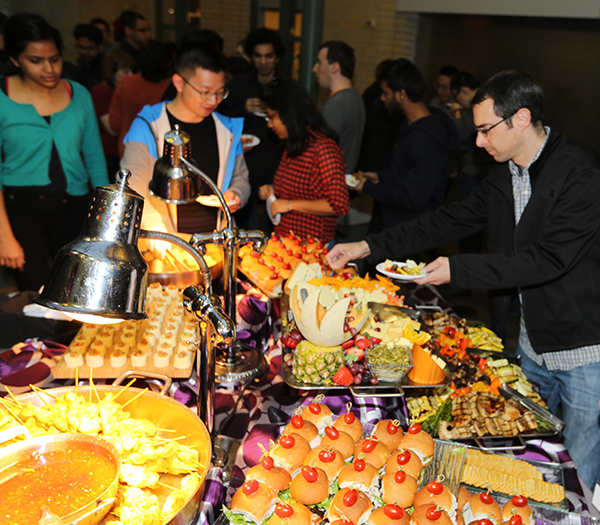Becoming Teammates: Designing Assistive, Collaborative Machines
Abstract: The growing power in computing and AI promises a near-term future of human-machine teamwork. In this talk, I will present my research group’s efforts in understanding the complex dynamics of human-machine interaction and designing intelligent machines aimed to assist and collaborate with people. I will focus on 1) tools for onboarding machine teammates and [...]
Robotics Institute Winter Party
Please join us for some fun, food, beverages and conversation! All RI faculty, staff, students and visitors are invited to the Robotics Institute Winter Party! We apologize but due to space limitations in the Atrium we regretfully cannot include family or other non-RI guests.
Learning Local Heuristics in Heuristic Search
Abstract: Motion planning is a fundamental problem in robotics; how can we move robots efficiently and safely? Motion planning can be solved using several paradigms with their own strengths and weaknesses. This talk dives into Heuristic Graph Search and its application to motion planning by converting it to a problem of finding a start-goal path [...]
Low-Cost Multimodal Sensing and Dexterity for Deformable Object Manipulation
Abstract: To integrate robots seamlessly into daily life, they must be able to handle a variety of tasks in diverse environments, like assisting in hospitals or cooking in kitchens. Many of the items in these environments are deformable such as bedding in hospitals or vegetables in kitchens, and a certain level of dexterity is necessary [...]
Joint 2D and 3D Semi-Supervised Object Detection
Abstract: While numerous 3D detection works leverage the complementary relationship between RGB images and point clouds, developments in the broader framework of semi-supervised object recognition remain uninfluenced by multi-modal fusion. Current methods develop independent pipelines for 2D and 3D semi-supervised learning despite the availability of paired image and point cloud frames. Observing that the distinct [...]
New Methods for Satellite Control
Abstract: Since 2003, the number of satellites launched into orbit has grown from 100 per year to over 2000 per year. Over that same timeframe, incredible advances have been made in control systems for terrestrial robotics and autonomy. Despite the increased quantity of satellites in orbit and the advances made in terrestrial control systems, satellite [...]
[MSR Thesis Talk] Development and Testing of a Software Stack for an Autonomous Racing Vehicle
Abstract: Autonomous racing aims to replicate the human racecar driver with software and sensors. As in traditional motorsports, Autonomous Racing Vehicles (ARVs) are pushed to their dynamic limits in multi-agent scenarios at high (>= 100mph) speeds. This Operational Design Domain (ODD) presents unique challenges across the autonomy stack. The Indy Autonomous Challenge (IAC) is an [...]
[MSR Thesis Talk] Kitchen Robot Case Studies: Learning Manipulation Tasks from Human Video Demonstrations
Abstract: The vision of integrating a robot into the kitchen, capable of acting as a chef, remains a sought-after goal in robotics. Current robotic systems, mostly programmed for specific tasks, fall short in versatility and adaptability to a diverse culinary environment. While significant progress has been made in robotic learning, with advancements in behavior cloning, [...]
Towards Agile Robotics: Creating Push-Off Skills for Dynamic Interactions
Abstract: Dynamic interactions play a fundamental role in human capabilities, enabling us to achieve a wide range of tasks such as moving heavy objects, manipulating our surroundings, and changing directions rapidly and safely. In contrast, most conventional robotic systems lack this level of agility and cannot perform dynamic interactions, limiting their potential in practical applications. [...]
Learning Safe Human-Robot Interactions for a Seamlessly Shared Airspace
Abstract: The growing need for fully autonomous aerial operations in shared spaces, necessitates the development of reliable agents capable of navigating safely and seamlessly alongside uncertain human agents. In response, we advocate endowing autonomous agents with the ability to predict human actions, comprehend and ground abstract rules in the action space, and embrace the uncertainty [...]








